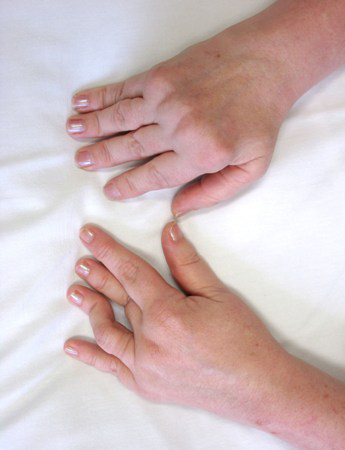Summary
Definition
History and exam
Key diagnostic factors
- active symmetric arthritis lasting >6 weeks
- age 50 to 55 years
- female sex
- joint pain
- joint swelling
Other diagnostic factors
- morning stiffness
- swan neck deformity
- Boutonniere deformity
- ulnar deviation
- rheumatoid nodules
- vasculitic lesions
- pleuritic chest pain
- scleritis and/or uveitis
Risk factors
- genetic predisposition
- smoking
- overweight or obesity
- infection
Diagnostic tests
1st tests to order
- rheumatoid factor (RF)
- anticyclic citrullinated peptide (anti-CCP) antibody
- radiographs
- ultrasonography
Tests to consider
- disease activity score(s)
- MRI
Treatment algorithm
mild disease activity at initial presentation: not pregnant or planning pregnancy
moderate-to-severe disease activity at initial presentation: not pregnant or planning pregnancy
pregnant or planning pregnancy
failure to reach low disease activity after 3 months of therapy: not pregnant or planning pregnancy
Contributors
Authors
Yusuf Yazici, MD

Clinical Associate Professor of Medicine
New York University School of Medicine
New York
NY
Disclosures
YY receives research support from BMS and Amgen; he has consulted for Amgen, BMS, Hemay, Chugai, and Sanofi.
Peer reviewers
Joshua F. Baker, MD, MSCE
Associate Professor of Medicine and Epidemiology
University of Pennsylvania
Pennsylvania
PA
Disclosures
JFB has received consulting fees from Bristol-Myers Squibb, Pfizer, Cumberland Pharma, and CorEvitas.
Peer reviewer acknowledgements
BMJ Best Practice topics are updated on a rolling basis in line with developments in evidence and guidance. The peer reviewers listed here have reviewed the content at least once during the history of the topic.
Disclosures
Peer reviewer affiliations and disclosures pertain to the time of the review.
References
Key articles
Fraenkel L, Bathon JM, England BR, et al. 2021 American College of Rheumatology guideline for the treatment of rheumatoid arthritis. Arthritis Rheumatol. 2021 Jul;73(7):1108-23.Full text Abstract
National Institute for Health and Care Excellence. Rheumatoid arthritis in adults: management. Oct 2020 [internet publication].Full text
Smolen JS, Landewé RBM, Bergstra SA, eta al. EULAR recommendations for the management of rheumatoid arthritis with synthetic and biological disease-modifying antirheumatic drugs: 2022 update. Ann Rheum Dis. 2023 Jan;82(1):3-18 Epub 2022 Nov 10.Full text Abstract
Reference articles
A full list of sources referenced in this topic is available to users with access to all of BMJ Best Practice.

Differentials
- Psoriatic arthritis (PsA)
- Infectious arthritis
- Gout
More DifferentialsGuidelines
- 2023 American College of Rheumatology (ACR) guideline for the screening and monitoring of interstitial lung disease in people with systemic autoimmune rheumatic disease
- Guideline for vaccinations in patients with rheumatic and musculoskeletal diseases
More GuidelinesPatient information
Rheumatoid arthritis
Rheumatoid arthritis: questions to ask your doctor
More Patient informationLog in or subscribe to access all of BMJ Best Practice
Use of this content is subject to our disclaimer